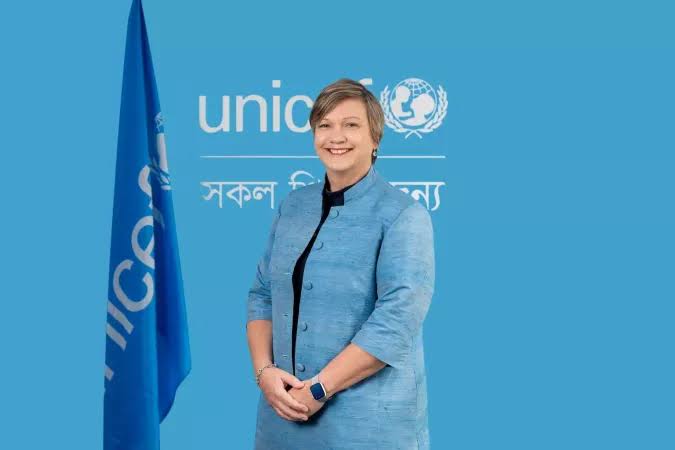Diplomatic Correspondent
Published:2025-02-15 12:37:36 BdST
UNICEF urges safer, fairer future for Bangladeshi youths
UNICEF has said it seeks a justice system fit for children that ends their criminalisation.
“Rather than treating children as threats, ensure they understand their accountability, recognize them as rights holders in need of care, protection, and rehabilitation,” said the UN agency.
“Ensure child-sensitive legal processes: where specialized courts, legal aid, and child-sensitive investigations uphold children’s rights,” UNICEF Representative in Bangladesh Rana Flowers said in a statement in response to the OHCHR fact-finding report "Human Rights Violations and Abuses related to the Protests of July and August 2024 in Bangladesh."
For children who are found by the courts to have committed a crime, she called for expanding the alternatives to detention—diversion programs, probation, and restorative justice that replaces punitive approaches that inflict lasting harm.
Flowers said Bangladesh is at a moment of great hope, change, and transformation.
"With reform commissions currently looking at ways to rebuild and reshape the future of its policing, courts, and justice systems, there is an opportunity to create a safer, more just environment for the younger generation," she said.
"Let us seize this moment for meaningful reform and ensure that no child, family and community in Bangladesh has to go through such tragedies again," Flowers said.
She said the UN Human Rights Office report on the tragic events that took place in Bangladesh in July and August 2024 is both shocking and heartbreaking.
Among the 1,400 people the report estimates were killed between July 1 and August 15, more than a hundred were children.
"UNICEF reported on many of these deaths and has continued to work on clarifying how many children were killed or hurt—we mourn each and every one of them," Flowers said.
Gender-based violence, including physical assaults and threats of rape, was also documented, aimed at deterring females from participating in protests.
Children were not spared; they were killed, maimed, arbitrarily arrested, detained in inhumane conditions, and tortured.
In one harrowing case, a 12-year-old protester in Dhanmondi died from internal bleeding caused by 200 metal shot pellets.
Another tragic incident involved a six-year-old girl in Narayanganj, who was killed by a bullet to the head while observing clashes from her rooftop.
On August 5, one of the deadliest days of the protests, a 12-year-old boy in Azampur described police firing "everywhere like rainfall," witnessing at least a dozen dead bodies.
"These findings must horrify us all, and UNICEF appeals to all across Bangladesh to ensure “never again” must this be allowed to happen to children in Bangladesh," Flowers said.
In light of these findings, UNICEF, building on its previous statements on this tragedy, stressed the need for all policymakers in Bangladesh, political actors and officials to work urgently on three key aspects to help the children, young people and families of Bangladesh to heal and to move forward with hope.
First, she said, there must be some accountability and some reconciliation for those children whose lives have been lost and whose families grieve for them.
"Second, let us call for justice, supporting and ensuring reintegration of those who remain in detention, or who are otherwise affected by these events," Flowers said.
Third, and perhaps most pressingly, she said let this be a moment of catalytic change.
"A time for all political actors, parties and policymakers to reach a consensus on the need for reforms to policing and justice systems so that no child in Bangladesh ever again faces arbitrary detention, a lack of due process, torture, or violence for exercising their right to peaceful assembly, and so that children in Bangladesh can fully realize their right to safety, dignity and justice," said the UNICEF Representative.
In calling for accountability and reform, UNICEF offered support to ensure there are independent investigations into all cases of violence, abuse, and unlawful detention of children and justice sector reforms that align Bangladesh’s legal framework with international standards for child protection.
UNICEF sought stronger safeguards to prevent future violations, including the establishment of independent monitoring mechanisms.
UNICEF called for protecting child protesters and survivors, ensuring that accountability mechanisms are established to prevent further violations against children and ensure justice for victims.
Unauthorized use or reproduction of The Finance Today content for commercial purposes is strictly prohibited.


